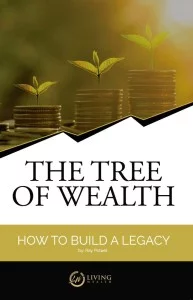In this episode, we sit down with Rabbi Daniel Lapin. He enlightens us on the spiritual nature of money and the tragedy of resentment.
Rabbi Daniel Lapin is the author of Thou Shall Prosper and Business Secrets from the Bible, among many other works. He is the President of The American Alliance of Jews and Christians and is an exceptionally gifted communicator.
He reaches out to both Jews and Christians with Biblical money principles and ancient Jewish wisdom, mainly in regards to finance and business. And he has become one of America’s most compelling and persuasive voices in defense of what he calls “Ethical Capitalism.”
Topics Discussed with Rabbi Daniel Lapin:
- Does God want you to be rich?
- What is money
- The case for the spiritual nature of money
- The instincts that hold people back
- The tragedy of resentment
- Defining spiritual and why it’s important
- Rabbi Lapin’s most useful pet of all, a chimpanzee
- The interplay of trust, faith, and money
- Why understanding what money is and how it behaves important
Connect with Rabbi Lapin:
Want Financial Freedom?

Start your journey to financial freedom with this first step.
Get our 122 page eBook The Tree of Wealth here now.
Episode Takeaways:
Transcript: Rabbi Daniel Lapin on the Spiritual Nature of Money
Nate: It is great to have you with us today Rabbi Lapin.
Rabbi Lapin: Thanks so much. I’ve been looking forward to this.
Holly: And I’m just so excited to hear what you have to share with us and our listeners. This first part, it’s going to be a two-part, in regards to just spiritual success strategies and how those actually effect you in growing and understanding wealth and how it actually relates to your life.
Without further ado, if you don’t mind I’m going to jump right in unless you have one golden nugget you want to start with. What’s one golden nugget you would say is vital when we’re talking about spiritual success?
Rabbi Lapin: That the good Lord gave us two ears and one mouth, so in general we should talk about half the amount of time we listen.
Holly: So while we do this podcast I’m going to be listening and you’re going to be talking, right?
Rabbi Lapin: Well, not necessarily what I meant but I hear the point.
Holly: So with that, I wanted to ask you, would you truly believe and do you suggest that God really wants … God of the bible, so I’m going to prefix that, really does want us or desire his children or people to be rich?
Rabbi Lapin: It’s a tricky question because I want to be very precise and I want to be very practical and I want to be very helpful. So I must clearly state at the outset that we’re not talking prosperity gospel, we’re not talking about an approach that teaches, hey, you know what, God wants you to be rich, and all you’ve got to do is pray for that Ferrari and when you go out to the driveway in the morning gosh, well, guess what, it’s going to be a Lamborghini because you weren’t precise. No, it’s not how it works. Praying for a Ferrari, good luck to you, go for it if you want. I think God hears your prayers but I also think he said no.
The idea is not that God wants you to be rich, the idea is that God wants us to become obsessively preoccupied with the needs of all his other children. You have to remember that the very first time we ever heard God getting grumpy is in the second chapter of Genesis where God, “It’s not good for man to be alone.” Up til that point we’ve heard eight separate times the scripture says, “And God saw that it was good.” The first time it’s not good is for man to be disconnected and alone, and it’s not just talking about Adam’s marriage, it’s talking about God’s desire for all of us to be connected to one another.
As a matter of fact it’s not an accident that in one of his books Malcolm Gladwell made the point that the most reliable correlation for people who make a lot of money is not brains, it’s not inheritance, it’s knowing a lot of people, having a lot of friends. And I don’t mean friends on Facebook, because I’d happily exchange 500 friends on Facebook for one real live friend. It’s talking about connections.
And so what I would say is not God wants us to be rich, I wouldn’t say that at all, what I would say is God wants us to become excessively preoccupied with filling the needs and the desires of other people. It comes as no surprise to me at all that a good and loving God responds to that with the incredible blessing of financial abundance.
Nate: Absolutely, and I think that, that may be a bit of a new idea to some simply because, especially us of the Christian faith, for whatever reason we seem to have put a virtue on poverty it would almost seem. You’re here telling us that God actually rewards those for serving other people, in fact that’s part of the way he built the world is essentially what you’re saying, is the more people you can serve, wealth is your reward for doing so.
Rabbi Lapin: That’s exactly right. I also just want to stress that I can just as easily make that whole argument I’ve just made without reference to God or the bible. In other words, I can use nothing but the language of economics, nothing but the language of business, to again stress that money is the consequence of one human being supplying the needs or desires of another human being. That is an absolute foundational principle.
I would go further and say that any time that a government or a politician attempts to artificially bring money into existence by printing it, by turning the crank at the mint, the result is the very painful evil of inflation. In other words, any attempt to separate money from its creative source, which is namely one human being serving another, the result is always tragic.
Nate: I would agree with that completely. So if you wouldn’t mind, would you explain, and I’ve heard you explain it before but I’d love to really delve into it, how can human beings doing business, conducting business with each other, create money and bring it into existence as opposed to just having it be printed at the Federal Reserve or whatever it is at the country you’re speaking of?
Rabbi Lapin: As long as folks don’t realize the spiritual nature of money it becomes almost inevitable that they will end up with the wrong perception of it. I’m going to say God created us, but again we may well have listeners who don’t believe in God, who are not bible enthusiasts or anything like that, and that’s fine because I indicate where my information comes from, but the only thing you have to be concerned about is whether the information is true, accurate, and helpful, or not. If I say that a genie popped out of a bottle and told me this, who cares where it comes from? The issue is only is it helpful, is it relevant, is it true and accurate? That’s all.
So it is a reality that we are created with certain natural negative instincts. In other words, most of us, almost every human being, is created with an instinct of laziness. We would rather sit in an armchair watching television and eating chocolate than we would prefer to be digging a well in the garden or working hard on some project. Any of us would prefer that. We are created with an instinct for laziness, and part of what success means is overcoming our natures, rising beyond our instincts.
Another of our instincts is resentment, and unfortunately it’s tragic that in many cultures in many societies the patent is to fan the resentment and increase people’s feeling of being taken advantage of. And so it’s not surprising that so many people are eager and ready to believe that the reason they are not as well off financially as they would like to be is because of somebody else. It’s some institution, it’s some ism, it’s this or that, and very often the culprit, certainly in our times today, the culprit is very often suggested as “the rich”.
And so you have the slur that taints the rich, and people get it all the time in their popular entertainment the villain in movies and in TV shows, very often the villain, the murderer, the evil guy, is nearly always a business professional. As a matter of fact, I’m so tired of it that whenever I see the camera pan up the side of the gleaming skyscraper towards the penthouse office on the top floor, I know we’re on our way to meet the bad guy. His company is doing something evil or something horrible and he’s right at the heart of it.
This is part of the indoctrination, when you keep hearing politicians saying, “The rich must pay their fair share.” This is designed to fan the flames of resentment in the part of the rest of us saying, “Yeah, yeah. If they would pay their fair share, those horrible rich people, then I’d be able to have some of the things I want.” This becomes very corrosive, it’s very destructive, and totally counterproductive for the goals and the ends that they were looking for.
People have to begin to understand what is really going on, and they have to understand, and here again this sort of lands us in probably another area of our discussion all together, they have to understand the spiritual nature of money.
Holly: Yeah, can you expand on that? Because most people would say it’s related to physical, money’s physical.
Rabbi Lapin: That is because people confused the terminology. I’m trained as an engineer, terminologies are very important, words are specific, unlike Humpty Dumpty and Alice in Wonderland, I really do mean what I say and say what I mean. When I say spiritual I’m not confusing that with holy, godly, pious, virtuous, biblical, I’m talking spiritual. Spiritual simply means something that you can not measure in a laboratory.
And so to give you an example, whether a certain sound is just a noise or whether it’s a piece of music so beautiful that it can bring tears to your eyes, there’s no instrument in any laboratory in the world that can tell the difference. This is purely something that takes place inside the human being. Music is very much of a spiritual entity. Now, obviously a violin or a saxophone or a drum is a very physical thing you can weigh it on a scale, but you can not weigh a tune on a scale.
It so happens that many of the characteristics that we’re looking for when we’re looking to hire associates in our business, we’re looking for non-measurable attributes. We’re looking for loyalty, you can’t measure that in spite of the fact that numerous psychology testing organizations exist, they really are doing nothing, you’re wasting your money because they pretend to be able to tell you that after a person has filled in a test whether that person is well suited to your job and to your company. That is just a waste of money.
There is no way of measuring a person’s integrity, there’s no way of measuring one of the most important things, which is a person’s resilience. There’s no way to measure a person’s resourcefulness, there’s no way to measure a person’s determination, there’s no way to measure a person’s will power.
None of these things, which are so important, I mean if anybody found a way to do it they’d become multi-millionaires because I would use their services and so would everybody else. This is one of the reasons that hiring and recruiting is so very, very difficult and very challenging, and something which you should do very slowly because it is very hard to measure spiritual characteristics. Only another human being can weigh them up. It would be great if we could plug a person into a machine and then get a reading and say, “Yeah, this is a perfect hire for your company.” No such thing.
And so when I speak about money being spiritual, yeah you can weigh a dime on a scale and you’ll see it weighs less than a penny. A penny weighs more than a dime but it isn’t worth more because the value of money is a total spiritual construct, it’s not something that is physically tied.
One piece of paper can have the word ‘1’ written on it, and another piece of paper can have the word ‘100’ written on it. The pieces of paper weigh the same, the piece of papers look the same, and yes while it is true that a machine can read them and say yeah, this one’s got a 100 written on it and the other one’s 1 one written on it. The fact is that physically the two pieces of paper are exactly the same.
Nate: That’s a really amazing point, I hadn’t thought of that. And I’ve heard you talk about it before, I just didn’t actually get it into my brain.
Rabbi Lapin: Well, one of the things I’ve never told you about before is my pet chimpanzee.
Nate: No you have not.
Rabbi Lapin: My pet chimpanzee is a really useful pet. Now, a dog can be useful as a watch dog or as a guide dog, goldfish can be useful to provide a feeling of tranquility, llamas, which we’ve kept llamas, that’s useful and wonderful. Now, cats I don’t get at all, so my apologies to all you cat lovers out there but I don’t see what cats do for you at all. I mean, they ignore you until you do something they want. But my pet chimpanzee, the most useful pet of all, because he can tell me the difference between spiritual and physical at any time of the day.
When I come home from work and want to wash up, take a shower, he gets that, he likes doing that also, playing around in water. When I sit down for dinner he gets that as well. But then I do something odd, me personally I say a grace before the meal. Now, at that point you can almost see my chimpanzee wrinkling his brow. He doesn’t get that all.
And then after dinner I sit down and put a newspaper in front of my face, interesting he doesn’t get that either, totally spiritual. Reading a paper, the process of reading, spiritual not physical. But if I look at a television and I watch a sitcom and people are doing things, my chimpanzee can understand that, he actually doesn’t even know the difference between that and real life. He doesn’t know whether he’s looking through a window or on to a flat screen. He has no idea at all but he totally recognizes human beings doing things, or if it’s an animal show he’ll get quite agitated, if it’s a show about other chimpanzees, because he’ll recognize them.
And so my chimpanzee is a very good detector of physical and spiritual. If my chimpanzee sees me walking into a store and handing over money and walking out with something that I wanted, he doesn’t get that. That transaction he simply doesn’t get. But if he sees me holding up somebody with a gun and grabbing their pocketbook, he gets it, that he can understand.
And so money is totally spiritual, in the same way that it makes so sense to go fishing if you don’t know something about fish, it makes no sense to increase revenue, cash flow, without knowing something about money. Of all the things that we have to know about it, its spiritual nature is the most important.
Holly: So would you say then that basically exchanging money, or as I’d like to term it, like money’s just a means of exchange, that basically when we exchange money with somebody else that, that is a spiritual interaction as well?
Rabbi Lapin: Yes, and particularly when I give you what I think might be a better definition of money. Instead of going with the classical economics 101, that money is a medium of exchange, et cetera, et cetera, a more accurate definition of money is proof that you’ve served another human being.
Holly: Oh, I like that.
Nate: I need to get myself more proof. That’s great, yeah. As Holly was kind of saying of the spiritual transaction, I never thought of it but is part of the reason why money is spiritual is because it has an element of faith and trust wrapped into the use of it? Or as people whose faith in the currency it becomes completely worthless, the same value to a chimpanzee as to us, just a piece of paper?
Rabbi Lapin: You’re spot on, very much so. A physical object can not have its reality changed by what other people think. To go back to my musical instrument, if other people come up to me and say, “You know that saxophone, that’s really a chocolate bar.” I think life’s too short to argue with lunatics. If I spend $400,000 on a Stradivarius violin built in Cremona in 1620 and somebody comes up to me and says, “That’s not a Stradivarius violin, that’s a cheap fiddle that somebody picked up at a roadside store in Louisiana.” It’s a very simple factual either I’m right or he’s right. What other people has nothing to do with it.
But my reputation is a spiritual thing, and it can be dramatically impacted by what other people think. Spiritual things can be impacted by what human beings think, physical things can not. And so one of the examples we’ve spoken about in the past obviously is if a lot of other people think that money is valueless, in other words if they lose faith in money as certainly happened in Germany during the 1920s and in early ’30s, then indeed it really does lose its value. That is one of the reasons why the greatest engine of prosperity in the history of the world, namely the United States of America, puts the phrase, “In God We Trust” not on churches or synagogues, but on money.
Just put it this way. I’m a farmer and I’ve just brought in my harvest, and I’ve got a whole lot of wheat, I’ve got a lot of cheese that we converted from dairy products, and milk we turned into cheese. I’ve got a cool warehouse filled with cheese, I’ve got a cool warehouse filled with wheat, I’ve got a warehouse filled with wool, and along comes somebody and says, “Hey, you know what? How would you like it if I give you a bunch of these colored strips of paper and I take away all your harvest?” I say to him, “You try that you’re going to be looking down the barrel of my 12 gauge.”
“That’s not going to happen. My family can’t eat strips of colored paper. That doesn’t work.” He says, “No, you don’t understand. Any time you need anything else, you need a gallon of milk, you need your car repaired, you need a new tractor, other people with accept those strips of paper from you.” I said to him, “I tell you what. How about you prove that first. Go and persuade them then come back to me.”
And by playing this little thought experiment you see how hard it is to understand how money even comes into existence, because why would any sane person exchange things that he can eat and things he can turn into clothing? Why would he exchange those for discs of metal or strips of colored paper? Or sometimes even not for that but just for a handshake? And the answer is something called trust. Something called faith.
Strip that away and there’s no money left. And that’s one of the reasons that we can be sure that money is by nature spiritual and not physical.
Nate: What I guess I’m curious about is why is it so important to understand the spiritual aspect of money and how it’s a spiritual thing? Practically speaking, me living my life, going through the motions, doing the things I do, why is it so vital that I do understand the fact that money’s spiritual and not physical? Which I’m sure if we ask the majority of our audience it would probably assume, if I asked them if money is spiritual or physical commodity or thing, they’d probably all say physical, or most of them would until they listened to you. You’ve said it’s very important, so I guess I’m curious to hear from you practically speaking why is it so valuable to understand the real truth about how money works?
Rabbi Lapin: Well, because money is important, and when people are asked the question, “Would you like much more money than you now have?” People are reluctant to respond honestly. Or you know, if, “Would you like to be really rich?” Regardless of the fact that there’s no definition there. But the truth is most people at least think the answer is yes but they’d be reluctant to say yes because they’ve been so successfully indoctrinated into believing that anybody who’d like to have more money is a bad person. I didn’t say loves money, that’s different, but who wants more money than he’s currently got.
Another way of phrasing that is, “Who wants to be of more service to more people than he currently is?” Yes. But when I ask audiences, “Would you like to have more money than you now have?” It’s very hard to gradually get people to acknowledge it, and then when I say, “Why?” They always give the wrong answer, which is, “That way I can give more money to charity.” And you know, God bless you, that’s wonderful, but that’s not the right answer. The right answer is because it will have proved that I’ve served my fellow human beings well.
And so if indeed you do want more money than you now have, I would only hope that you do want more, then you need to know how money behaves in order to be able to draw it towards you.
I gave the example of fishing. When I started fishing I got all the equipment and I went and dropped my hook in the water and I waited. Not surprising, absolutely nothing happened. It wasn’t until I hired a fishing guide who successfully showed me how ignorant I was. I wasn’t understanding fish, I was thinking of me. I was thinking I would like a salmon dinner, but I was paying no attention at all to what the salmon wants. I didn’t understand the salmon.
And while money is obviously an inanimate object, it’s a representation, it’s a symbol, it’s not a salmon, but at the same time if I don’t understand the nature of this thing I would like more of in my life, then you can hardly be surprised that I’m not going to see a whole lot more of it.
Nate: I can’t agree more with that. So in the spiritual aspect especially with knowing that money comes to those who serve others, just that knowledge can free people. It’s freed me to think it’s okay to earn more money, because for whatever reason there is this virtue, and you’ve already hit on it a few times, whereas the rich people are the problem a lot of times in movies and various things.
So we don’t know if making money is am I ripping everybody off to get it? If I had more of it does that mean they have less? We get all confused about money, whereas if we bare it down to what Rabbi Lapin has said, which is it’s just a certificate of proof that you’ve been able to help someone else get something that they desired, then that can free you up if you’re like me and had a mental hangup to say yeah, money in and of itself is not evil, it is not something to shy away from, but it is something to actually try to get more because that’s simple proof that you’ve been able to help more people than you’re currently helping. I love it.
Rabbi Lapin: You know, anybody whose ever been active in sports or in athletics knows that if you don’t believe that what you want to do can be done you will not succeed. That’s an absolutely reliable rule. If people do not believe that they can increase their revenue without sacrificing their morality, without being less of a person, without being a worse person, if you don’t believe that you won’t be able to do it. I think that’s really the outcome that we try and cure.
Holly: Another thought on that. When we talk about the money and proof that you’ve served someone, how does retirement then play into this belief that if we really do see money as spiritual and that really is that proof that you haver served another human being, how is retirement realistically possible then? Because in my mind I’m thinking why would anybody ever retire? Because they would stop serving other human beings. But maybe I’m off base there.
Rabbi Lapin: No, you’re not off base at all. What we help people to understand is that obviously people should do their best to try and secure financial freedom, they should try and attain a level of security and comfort, obviously. But the idea that as soon as I’ve got enough I’m going to quit working is wrong, and what is even more serious, it’s unhealthy. It’s very, very unhealthy for people. And part of that is because you stop being needed. As long as I’m still working at my job, presumably other people need me because they wouldn’t be paying me if I wasn’t delivering something of greater value to them.
So whatever it is that I do is valuable to people, and why I would stop doing that is incomprehensible, it doesn’t make any sense at all. Now, obviously when people get old the effort is harder and you have to really force yourself, but yeah, absolutely, that’s a good thing, it’s not a bad thing. The idea I’m planning on working only til I retire it taints your entire enterprise because it suggests that everything you do is underpinned by an essential selfishness.
Nate: And that’s a huge insight. I think that we’ve really hit our time limit for part one, but we have so much more to ask Rabbi Lapin and to get his wisdom on. I think we’ll even be doing a part two here, so we’re going to go ahead and close today’s session down but come in our next episode we’ll actually do part two with Rabbi Lapin and we’ll touch base many even further. I’d love to get more of his idea on retirement. We’re here as a financial podcast and most people think we’re just trying to help people retire, but we’re all in agreement with what Rabbi Lapin has said, and I’d love to get more ideas on how to live fruitfully today while also planning for the future and have the right mentality as you work.
Holly, any last words before we close down part one with Rabbi Lapin?
Holly: I just want to close with one thought, that really money is just proof that you have served another human being.
Nate: Rabbi, anything you’d like to say to close this out on part one here?
Rabbi Lapin: I think I’ve said quite enough.
Nate: Okay, very good. We’ll ask you some more in our next episode.
But this has been Dollars and Nonsense. If you follow the herd you will get slaughtered.
SaveSave









